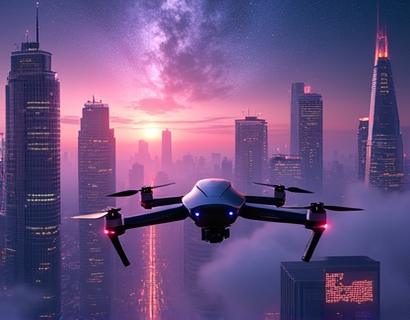Unlocking Digital Potential: Harnessing Crypto and AI for Next-Gen App Marketing Success
The digital landscape is rapidly evolving, driven by technological advancements in blockchain and artificial intelligence. These technologies, when combined, offer unprecedented opportunities for app marketers to enhance user engagement and drive growth. This article delves into the synergy of crypto and AI, exploring how they can transform app marketing and unlock new dimensions of digital success.
Understanding the Intersection of Crypto and AI
To harness the full potential of crypto and AI in app marketing, it's essential to understand the fundamental principles of both technologies. Cryptography, the foundation of blockchain, ensures secure and transparent transactions, while AI leverages machine learning and data analytics to predict user behavior and optimize marketing strategies.
The intersection of these technologies creates a powerful toolset for app marketers. Blockchain provides a decentralized and immutable ledger for transactions, enhancing trust and security. AI, on the other hand, enables personalized and dynamic marketing approaches, improving user experiences and increasing conversion rates.
Enhanced User Trust and Security
One of the most significant advantages of integrating crypto into app marketing is the enhanced trust and security it offers. Blockchain's decentralized nature ensures that user data and transactions are secure and tamper-proof. This is particularly crucial in an era where data breaches and privacy concerns are rampant.
By utilizing blockchain for user authentication and data management, app marketers can build a more trustworthy and secure environment. This not only protects user data but also fosters a stronger relationship between users and the app, leading to higher engagement and loyalty.
Personalized Marketing Through AI
AI's ability to analyze vast amounts of data and derive actionable insights makes it an invaluable asset in app marketing. By leveraging machine learning algorithms, marketers can gain deep insights into user behavior, preferences, and trends.
Personalized marketing campaigns can be created based on these insights, ensuring that users receive relevant and timely content. This not only improves user satisfaction but also increases the likelihood of conversions. AI-driven chatbots and virtual assistants can further enhance user engagement by providing real-time support and personalized recommendations.
Predictive Analytics and User Segmentation
AI's predictive analytics capabilities allow marketers to forecast user behavior and market trends with high accuracy. By analyzing historical data and identifying patterns, AI can predict which users are most likely to engage with specific features or promotions.
User segmentation is another area where AI shines. By dividing the user base into distinct segments based on behavior, demographics, and preferences, marketers can tailor their strategies to meet the unique needs of each group. This targeted approach not only optimizes resource allocation but also maximizes the impact of marketing efforts.
Automated Marketing Processes
The integration of AI in app marketing can significantly streamline and automate various processes. From campaign management to performance tracking, AI can handle tasks that would otherwise require manual intervention.
Automated A/B testing, for instance, allows marketers to quickly test different versions of ads, emails, or landing pages to determine which performs best. AI can also optimize ad placements and bidding strategies in real-time, ensuring the best possible return on investment.
Furthermore, AI-powered tools can monitor and analyze campaign performance continuously, providing real-time insights and recommendations for improvement. This level of automation not only saves time but also ensures that marketing strategies are always data-driven and optimized.
Leveraging Cryptocurrency for Incentives and Rewards
Cryptocurrency offers a unique opportunity for app marketers to incentivize user engagement and reward loyal users. By integrating crypto tokens or coins into their marketing strategies, apps can create a gamified experience that motivates users to participate actively.
For example, users can earn tokens for completing specific tasks, referring friends, or engaging with the app's content. These tokens can then be redeemed for rewards, exclusive content, or even used within the app's ecosystem. This not only increases user engagement but also builds a community around the app.
Crypto incentives can also be used to fund user-generated content or contests, further enhancing user participation and creating a vibrant, interactive community. The transparency and security of blockchain ensure that these transactions are fair and verifiable, adding another layer of trust to the system.
Building a Decentralized Marketing Ecosystem
The combination of crypto and AI can lead to the creation of a decentralized marketing ecosystem, where users and app developers collaborate in a transparent and equitable manner. Smart contracts, self-executing contracts with the terms directly written into code, can automate and enforce agreements between parties.
In this ecosystem, users can own and control their data, deciding how and when it is used for marketing purposes. This shift from centralized to decentralized control not only empowers users but also fosters a more sustainable and resilient marketing environment.
Decentralized autonomous organizations (DAOs) can play a significant role in this ecosystem, enabling community-driven decision-making and resource allocation. By leveraging DAOs, app marketers can tap into the collective wisdom and resources of the community, driving innovation and growth.
Challenges and Considerations
While the potential of crypto and AI in app marketing is vast, there are several challenges and considerations that must be addressed. Regulatory compliance is a major concern, as the crypto space is still navigating complex legal landscapes. Marketers must ensure that their use of crypto tokens and blockchain technology adheres to local and international regulations.
Another challenge is the technical complexity involved in integrating these technologies. App developers and marketers need to invest in building the necessary expertise or partnering with specialists to implement crypto and AI solutions effectively.
Additionally, user education is crucial. Many users are still unfamiliar with crypto and AI concepts, which can hinder adoption. Clear and transparent communication, along with user-friendly interfaces, can help bridge this gap and encourage wider acceptance.
Case Studies and Real-World Applications
Several apps and platforms have already begun to leverage the synergy of crypto and AI for marketing success. One notable example is a gaming app that uses blockchain to create a token-based economy, where players earn tokens for in-game achievements and can trade them on a decentralized marketplace.
The app employs AI to personalize game recommendations and in-app purchases, enhancing user engagement and increasing revenue. The transparency of blockchain ensures that all transactions are fair and verifiable, building trust among users.
Another example is a fitness app that uses AI to analyze user data and provide personalized workout plans. Users can earn crypto tokens for reaching fitness milestones, which can be redeemed for premium content or discounts on related products. This gamified approach not only boosts user engagement but also promotes a healthy lifestyle.
Future Trends and Opportunities
The future of app marketing is increasingly intertwined with crypto and AI. As these technologies continue to mature, we can expect to see more innovative applications and broader adoption across various industries.
One emerging trend is the use of non-fungible tokens (NFTs) in app marketing. NFTs can represent unique digital assets, such as exclusive content, virtual items, or even real-world experiences. By integrating NFTs into marketing campaigns, app developers can create unique and valuable offers that attract and retain users.
Another opportunity lies in the integration of AI-powered virtual assistants and chatbots with blockchain-based identity verification. This combination can provide seamless and secure user authentication, enhancing the overall user experience and reducing friction in the onboarding process.
Moreover, the rise of Web3 and decentralized applications (dApps) presents new opportunities for app marketers. By building on the Web3 infrastructure, apps can leverage decentralized protocols and smart contracts to create more resilient and user-centric marketing strategies.
Conclusion
The synergy of crypto and AI offers transformative potential for app marketing, enabling enhanced user trust, personalized experiences, and automated processes. By embracing these technologies, app developers and marketers can unlock new dimensions of user engagement and growth in the digital age.
While challenges exist, the benefits of a decentralized and data-driven marketing ecosystem are undeniable. As the tech landscape continues to evolve, those who harness the power of crypto and AI will be well-positioned to lead the way in app marketing success.










































